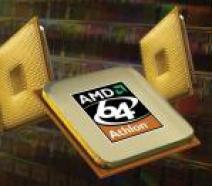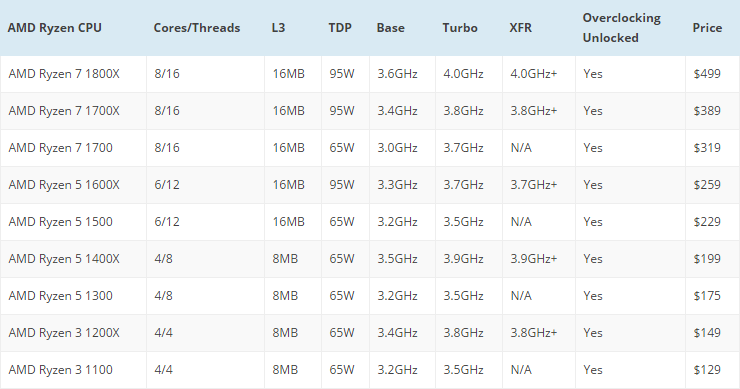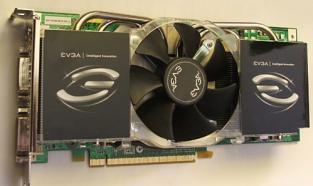OOPS! You forgot to upload swfobject.js ! You must upload this file for your form to work.
Three versions why AMD Ryzen younger processors are slow
![]()
|
xtreview is your : Video card - cpu - memory - Hard drive - power supply unit source |
|
|||
|
|
||||
 Recommended : Free unlimited image hosting with image editor
Recommended : Free unlimited image hosting with image editor
|
xtreview is your : Video card - cpu - memory - Hard drive - power supply unit source |
|
|
|
|
||
|
Xtreview Support  N-Post:xxxx Xtreview Support        |
THREE VERSIONS WHY AMD RYZEN YOUNGER PROCESSORS ARE SLOW |
| Please Feel Free to write any Comment; Thanks  |
Retail boxed versions of economical processors Bristol Ridge (2017-09-03)
New images of two versions AMD Radeon RX Vega (2017-07-29)
AMD promises to ship Vega gaming versions this quarter (2017-07-26)
Non-standard versions of Radeon RX Vega will appear by September (2017-07-15)
The Japanese waited for boxed versions of Intel Skylake-X processors (2017-07-15)
Non-standard versions of Radeon RX Vega will be ready in August (2017-07-12)
MSI releases special BIOS versions of motherboards for crypto currency production (2017-07-08)
Miners will soon be offered special versions of the GeForce GTX 1080 (2017-06-30)
Multi-core versions of Intel Skylake-X may require a new revision of the LGA 2066 connector (2017-06-05)
Tesla will abolish versions of electric vehicles with a battery capacity of 90 kWh (2017-06-05)
Manufacturers of video cards do not share optimism about versions of GeForce GTX 1080-1060 with faster memory (2017-06-01)
NVIDIA prepares new versions of mobile video cards GeForce GTX 1080 and GTX 1070 (2017-04-30)
We study the marking of faster memory versions GeForce GTX 1080 (2017-04-22)
Radeon RX 550 will be offered in two versions Radeon RX 550 will be offered in two versions (2017-04-20)
The consumer versions of Intel Optane drives will cut the system boot time by half (2017-03-28)
AMD Vega will be offered in versions with 4 GB and 8 GB memory type HBM2 (2017-03-25)
The first tests of non-standard versions of GeForce GTX 1080 Ti (2017-03-16)
Alternative versions of GeForce GTX 1080 Ti Asus will be released in April (2017-03-13)
Asus and MSI are ready to offer their own versions of GeForce GTX 1080 Ti (2017-03-03)
Three versions why AMD Ryzen younger processors are slow (2017-02-16)
![]()
To figure out your best laptops .Welcome to XTreview.com. Here u can find a complete computer hardware guide and laptop rating .More than 500 reviews of modern PC to understand the basic architecture


7600gt review
7600gt is the middle card range.
We already benchmarked this video card and found that ...

 geforce 8800gtx and 8800gts
geforce 8800gtx and 8800gts  Xtreview software download Section
Xtreview software download Section  AMD TURION 64 X2 REVIEW
AMD TURION 64 X2 REVIEW  INTEL PENTIUM D 920 , INTEL PENTIUM D 930
INTEL PENTIUM D 920 , INTEL PENTIUM D 930  6800XT REVIEW
6800XT REVIEW  computer hardware REVIEW
computer hardware REVIEW  INTEL CONROE CORE DUO 2 REVIEW VS AMD AM2
INTEL CONROE CORE DUO 2 REVIEW VS AMD AM2  INTEL PENTIUM D 805 INTEL D805
INTEL PENTIUM D 805 INTEL D805  Free desktop wallpaper
Free desktop wallpaper  online fighting game
online fighting game  Xtreview price comparison center
Xtreview price comparison center Lastest 15 Reviews


Rss Feeds
Last News
- The new version of GPU-Z finally kills the belief in the miracle of Vega transformation
- The motherboard manufacturer confirms the characteristics of the processors Coffee Lake
- We are looking for copper coolers on NVIDIA Volta computing accelerators
- Unofficially about Intels plans to release 300-series chipset
- The Japanese representation of AMD offered monetary compensation to the first buyers of Ryzen Threadripper
- This year will not be released more than 45 million motherboards
- TSMC denies the presentation of charges from the antimonopoly authorities
- Radeon RX Vega 64 at frequencies 1802-1000 MHz updated the record GPUPI 1B
- AMD itself would like to believe that mobile processors Ryzen have already been released
- AMD Vega 20 will find application in accelerating computations
- Pre-orders for new iPhone start next week
- Radeon RX Vega 57, 58 and 59: the wonders of transformation
- ASML starts commercial delivery of EUV-scanners
- The older Skylake processors with a free multiplier are removed from production
- Meizu will release Android-smartphone based on Helio P40
- AMD Bristol Ridge processors are also available in American retail
- The fate of Toshiba Memory can be solved to the next environment
- duo GeForce GTX 1080 Ti in GPUPI 1B at frequencies of 2480-10320 MHz
- New Kentsfield overclocking record up to 5204 MHz
- Lenovo released Android-smartphone K8

HALO 3 HALO 3 - Final Fight!

PREY Prey is something you don t often see anymore: a totally unigue shooter experience.

computer news computer parts review Old Forum Downloads New Forum Login Join Articles terms Hardware blog Sitemap Get Freebies



